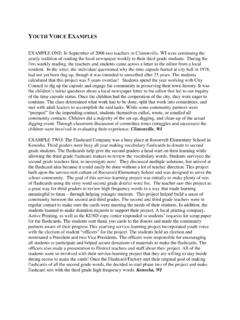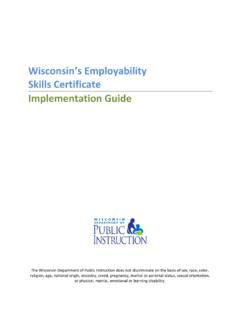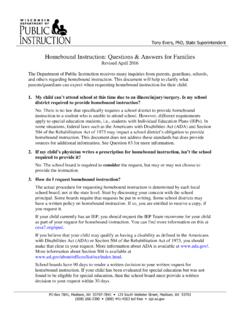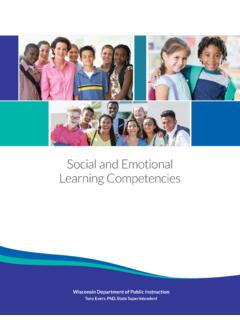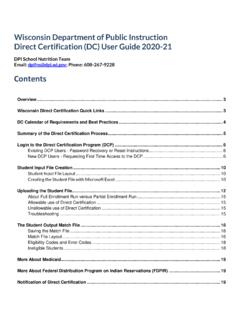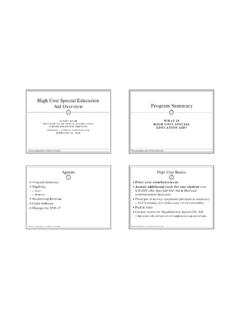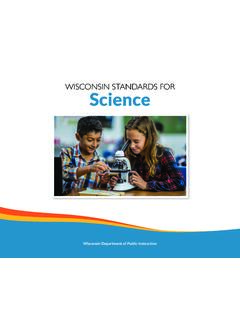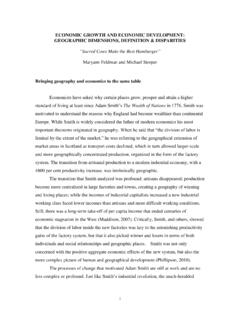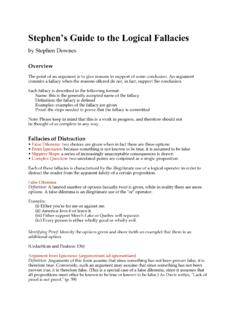Transcription of What is Disciplinary Literacy? Why is disciplinary ...
1 Common Core state standards for literacy in aLL sUBJeCts 23 What is Disciplinary Literacy? literacy , the ability to read, write, listen, speak, think critically and perform in different ways and for different purposes, begins to develop early and becomes increasingly important as students pursue specialized fields of study in high school and beyond. The Common Core State Standards (CCSS) for literacy in Science, Social Studies, History, and the Technical Subjects are connected to College and Career Readiness Standards that guide educators as they strive to help students meet the literacy challenges within each particular field of study. This national effort is referred to as Disciplinary Wisconsin, Disciplinary literacy is defined as the confluence of content knowledge, experiences, and skills merged with the ability to read, write, listen, speak, think critically and perform in a way that is meaningful within the context of a given field.
2 These abilities are important in ALL courses and subjects. While the Common Core State Standards (CCSS) for literacy in Science, Social Studies, History, and the Technical Subjects provide standards for cross-discipline reading and writing in grades 6-12, Wisconsin recognizes the need to broaden this effort and include all disciplines and every educator in every grade level K-12. This literacy focus must begin as soon as children have access to formal education and continue intentionally as college and career readiness goals advance for all children in address this expanded definition and approach to Disciplinary literacy , excerpts from the K-5 Common Core State Standards for English Language Arts are included in this document. Elementary classroom teachers build the foundational literacy skills necessary for students to access all learning. Additionally, they develop content specific to deep literary study, oratory tradition and linguistic analysis; skills specific to English language arts.
3 literacy reaches beyond this knowledge in one content area to include reading, writing, listening, speaking and thinking critically in each discipline beginning at an early age. The applicable K-5 standards help educators in Wisconsin build a ladder of skills and dispositions that lead to accelerated achievement across disciplines and will be included in every content-specific standards document into the is Disciplinary literacy important?The modern global society, of which our students are a part, requires postsecondary learning. An analysis of workforce trends by Georgetown University economist Anthony Carnevale and his colleagues found that nearly 60 percent of all job openings in 2007 required some postsecondary education; postsecondary success depends on students ability to comprehend and produce the kinds of complex texts found in all disciplines. Therefore, the economic future of our state, as well as our students and their success as productive citizens and critical thinkers link to Disciplinary , articles, manuals and historical primary source documents create specialized challenges for learners.
4 These texts often include abstracts, figures, tables, diagrams and specialized vocabulary. The ideas are complex and build across a number of paragraphs requiring focus and strategic processing. To comprehend and produce this type of text, students must be immersed in the language and thinking processes of that discipline and they must be supported by an expert guide, their teacher (Carnegie Report, 2010).A focus at the elementary level on foundational reading, when expanded to include engaging experiences connected to informational texts, vocabulary, and writing for content-specific purposes builds background knowledge and skills in each discipline. This increases opportunities for success as students approach more rigorous content in those disciplines (Alliance for Excellent Education, 2011).Reading, writing, speaking, listening and critical thinking must be integrated into each discipline across all grades so that all students gradually build knowledge and skills toward college and career readiness.
5 Collaboration among Institutes of Higher Education, CESA Statewide Network, districts, schools, teachers and family and community will guide the implementation of the Common Core State Standards in Wisconsin. Common Core state standards for literacy in aLL sUBJeCts 24 The message is that literacy is integral to attainment of content knowledge and content is essential background knowledge for literacy development. This interdependent relationship exists in all Common Core State Standards require educators to support literacy in each classroom across the state. Since the impact of this effort is significant, it is essential that resources and supports be accessible to all educators. To build consistent understanding, DPI convened a statewide Disciplinary literacy Leadership Team in 2011 comprised of educators from many content areas and educational backgrounds. This team was charged with examining the CCSS for Disciplinary literacy , identifying the needs in the field for support, and gathering materials and resources to address those needs.
6 Resources are available at Core state standards for literacy in aLL sUBJeCts 25 Wisconsin Foundations for Disciplinary LiteracyTo guide understanding and professional learning, a set of foundations, developed in concert with Wisconsin s Guiding Principles for Teaching and Learning, directs Wisconsin s approach to Disciplinary learning begins in early childhood and develops across all discipline has its own specific vocabulary, text types, and ways of communicating. Children begin learning these context- and content-specific differences early in life and continue through high school and beyond. While gardening, small children observe and learn the form and function of a root, stem, leaf and soil; or measure, mix and blend while baking a cake. School offers all students opportunities to develop the ability to, for example, think like a scientist, write like a historian, critique like an artist, problem-solve like an auto mechanic, or analyze technological advances like a health care technician.
7 As literacy skills develop, educators gradually shift the responsibility for reading, writing, listening, speaking and critical thinking to students through guided supports in both individual and collaborative learning knowledge is strengthened when educators integrate discipline-specific literacy into teaching and help students recognize and understand the nuances of a discipline by using strategies that make their thinking visible. They promote classroom reading, writing, listening, speaking and critical thinking using authentic materials that support the development of content-specific knowledge. They guide students through these complex texts by using strategies that develop conceptual understanding of language and set expectations for relevant application of skills. These literacy practices deepen students content knowledge, strategies and skills so that their learning transfers to real world situations.
8 The literacy skills of reading, writing, listening, speaking and critical thinking improve when content-rich learning experiences motivate and engage students. Educators who foster Disciplinary literacy develop experiences that integrate rigorous content with relevant collaborative and creative literacy processes to motivate and engage students. Setting high expectations, they structure routines and supports that empower students to take charge of their own learning. When students work in teams to research science and mathematics concepts in the development of an invention or a graphic arts design; when they collaboratively build a blog that explains their recent marketing venture, they use specific literacy skills and strategies to solidify learning. Students need these opportunities over time to develop the precise and complex reading, writing, listening, speaking and critical thinking skills demanded in today s careers.
9 Students demonstrate their content knowledge through reading, writing, listening, and speaking as part of a content-literate who are literate in a particular discipline are able to successfully read, write, and speak about that discipline and can listen to and think critically as others communicate in that community. Performance tasks that allow students to present the complexity of a content area in a way that is meaningful to the field become authentic approaches to assessing mastery within a discipline. Such tasks empower students to discover the real world connections across disciplines and to actively participate in communities of discipline-literate peers. As Wisconsin moves to the SMARTER Balanced Assessment System these performance tasks will be integral to assessment of student in Demonstrate Build strong content and Respond to the varying demands of audience, task, purpose and discipline.
10 4. Comprehend as well as critique. 5. Value evidence. 6. Use technology and digital media strategically and capably. 7. Come to understand other perspectives and cultures. Reading Writing Speaking Listening Language Common Core state standards for literacy in aLL sUBJeCts 26 What research and resources are available to support educators use of the Common Core State Standards for literacy in All Subjects?The Common Core State Standards for literacy in All Subjects reflect the importance of literacy in both the oral and written language and in both productive (speaking and writing) and receptive (listening and reading) discourse. Clearly, critical and precise thinking are required to develop all of these specific strategies and skills. The standards also address the learning and functioning of language in a technological, media-driven world because the language that we use is selective depending upon the context of the following section will offer relevant research and resources to support professional learning in reading, writing, speaking, listening and language across disciplines.
